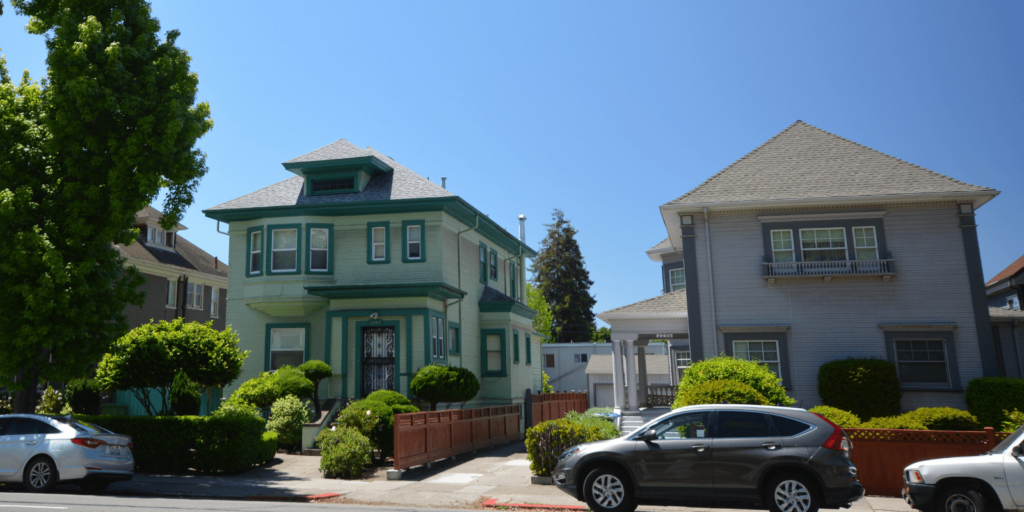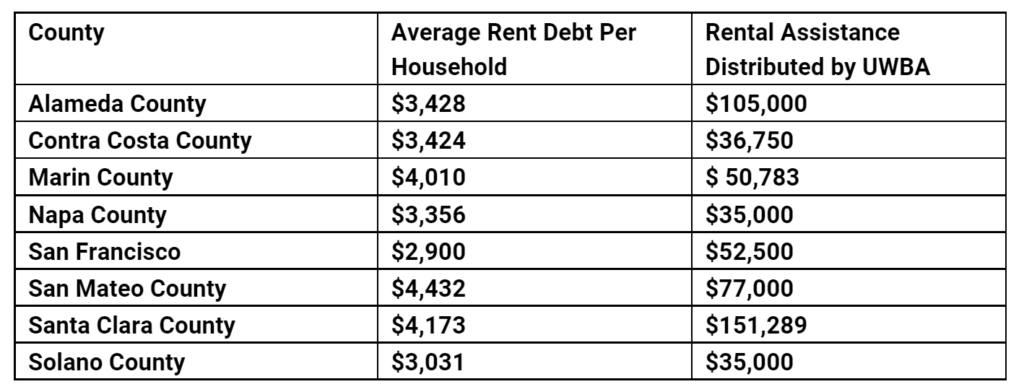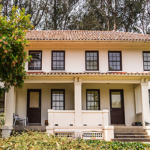Search
UWBAs Housing Policy Watch
May 31, 2022

Breaking Down Critical Policies that Advocate for Affordable Housing in the Bay Area.
The month of May is dedicated to affordable housing, a time to raise further awareness about the shortage of housing options, particularly for low-income communities. This continues to be a pressing issue for Bay Area families, where historical disparities reproduced in today’s housing system operate in tandem with the immense racial wealth gap. Advancing economic equity for residents requires expanding affordable housing; here are just a few policies at the state and local level that may help support this goal:
State Level
Community Anti-Displacement & Preservation Program (CAPP)
What is it?
CAPP requests $500 million from the state budget surplus to allow mission-driven organizations to finance the acquisition of occupied, currently unsubsidized, rental housing and preserve it as permanently affordable homes. This will help prevent displacement by:
- Creating a partnership between The California Department of Housing & Community Development (HCD), community development financial institutions, & local governments
- Providing revolving short-term acquisition capital and a long-term public subsidy through a single, streamlined program
- Providing financing & technical assistance to mission-driven organizations like community development corporations, community land trusts, & BIPOC-led groups who often face barriers to accessing resources
How is it related?
- Many low-income communities are required to live in market-rate housing which is becoming increasingly unaffordable. As rents outpace wage growth, this housing is becoming less and less accessible, leading to the displacement of families from their homes and communities.
- Between 2012 and –2017, the Bay Area lost 32,000 unsubsidized affordable homes annually. To date, no state housing program finances this anti-displacement and preservation strategy; local communities are looking to the state for support.
- While Project Homekey has demonstrated the advantages of preservation strategies – such as speed and cost-efficiency, CAPP would fill an unmet need by providing quickly-deployable capital to purchase private rental housing from the speculative market, stabilize current residents, and bring homes into permanent affordable stewardship.
What does rent burden look like?

Current status of this bill & what you can do
- CAPP is currently moving through the budget process (PDF).
- If you’re interested in advocating for this initiative, please contact your legislators and voice your support.
AB 1816: Reentry and Workforce Development
What is it?
Once enacted, AB 1816 would create a competitive grant program to fund evidence-based housing, support services, and workforce development for those who are formerly incarcerated.
How is it related?
Homelessness, poverty, and incarceration are linked. The California Department of Corrections and Rehabilitation has estimated 20% of people discharged from prison each year experience homelessness. Providing formerly incarcerated residents with an affordable place to live, that does not limit length of stay, along with services that promote housing stability and employment, is proven to reduce recidivism as well as, help them avoid experiencing homelessness.
What is the current status?
This bill has been read a second time and ordered to a third reading.
What can you do?
In 2021, United Way Bay Area served 112 formerly incarcerated individuals and supported 371 job placements through our SparkPoint and Labor programs. Our SparkPoint centers also provided career coaching services to 753 community members.
Contact your legislators and voice your support for AB1816, and while this bill moves through the process, consider supporting UWBA’s SparkPoint centers with your time and donations.
Local/Regional Level
San Jose’s Commercial Linkage Fee (CLF)
What is it?
- The Commercial Linkage Fee is the primary tool used by cities throughout the county to fund affordable housing development as they increase local employment.
- When the last City Council finally adopted a Commercial Linkage Fee in 2020, fees were set well below what was feasible due to the uncertainty of the pandemic.
- Along with 20+ housing organizations, UWBA supported Councilmembers Cohen, Jimenez, and Carrasco’s memorandum which asked the City Council to:
- Amend the ordinance so CLF is paid when a permit is issued (as opposed to deferred payment which burdens staff)
- Ensure Council reevaluates and considers increasing fees in September 2022
- Remove current waiver of fees for first 40,000 sq. ft of new office space, and align any fee reductions with neighboring jurisdictions
How is it related?
Making the changes recommended by Councilmembers Cohen, Jimenez, and Carrasco would make it easier to build affordable housing in San Jose, which is much needed as families still endure the economic impacts of COVID-19.
What is the current status?
Unfortunately, on March 29, 2022, San Jose’s City Council decided to postpone any further studies of commercial feel levels for another 18 months, or after 1 million square feet of office space has been newly leased downtown.
What can you do?
While the delay of the study and reevaluation of fees is not what was had hoped for, it’s crucial to hold the City Council accountable for carrying out the study on the new proposed timeline. Should this item come up in future City Council meetings, residents should submit public comment in favor of reevaluating commercial linkage fees to ensure the City of San Jose can produce the affordable housing so desperately needed.
City of Concord’s Anti-Harassment Ordinance
What is it?
On March 7, 2022, Concord’s Housing and Economic Development (HED) Committee voted in favor of forwarding a recommendation to adopt a Tenant Anti-Harassment Ordinance.
How is it related?
Harassment from landlords has led to countless self-evictions – tenants vacating their units out of fear, before they can be evicted by the landlord. However, many of these threats are baseless and used to specifically scare tenants knowing they will voluntarily vacate r. Once the tenant self-evicts, the landlord can raise the rent for the next tenant, displacing one family to charge another family more.
What is the current status?
Concord’s City Council is slated to review the draft ordinance at the City Council meeting on June 7, 2022. The agenda for the meeting, the staff report, revised draft ordinance and related documents will be available on the City’s agenda page in advance of the meeting.
What can you do?
Provide public comment by either attending the meeting in person (Council Chambers at Concord City Hall, 1950 Parkside Drive, Concord), participating virtually via Zoom (details will be included in the agenda), or calling into the meeting to vocalize your support for stronger tenant protections that prevent harassment leading to self-evictions.
Bay Area Housing Finance Authority Budget
What is it?
The Bay Area Housing Finance Authority (BAHFA) is an inaugural regional authority created to address the Bay Area’s chronic housing challenges. With $20 million from the state, BAHFA developed a strategic budget for BAHFA’s launch. This initial funding presents an opportunity to fund 5 pilot programs to advance affordable housing production, preservation, and tenant protections, as well as homeless prevention.
How is it related?
Of the 5 pilot programs, 2 focus specifically on increasing the production of affordable housing
- Doorway: Regionally coordinate efforts to create web-based portals across all nine Bay Area counties, providing information on affordable housing opportunities for the Bay Area’s 7.5 million residents
- Affordable Housing Pipeline: Regional database to track the production and preservation of affordable homes
What can you do?
Stay updated on this issue by tuning into BAHFA’s meetings here.
Other Actions
Eviction Protections
The state stopped accepting applications for the Emergency Rental Assistance Program (ERAP) on March 31. Since then, legal aid organizations supporting tenants have seen an increase in evictions. However, data on any unjust evictions that may be related to the pandemic are hard to come by. As a result, local advocacy organizations are planning a Court Watch to monitor court proceedings and keep track of the types of cases to see how many are unjust with the hopes of getting more data to advocate for stronger tenant protections and legal aid support.
What can you do?
To join his effort, please reach out to Betty Gabaldon, a tenant organizer in Contra Costa with East Bay Alliance for a Sustainable Economy. betty@workingeastbay.org
Stay informed on UWBA’s housing advocacy by signing up for housing justice newsletter or email our policy team to get involved.


